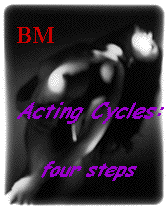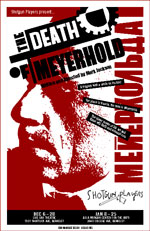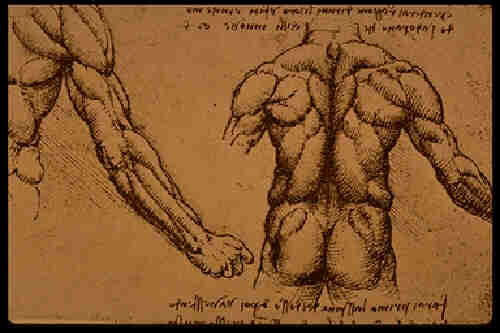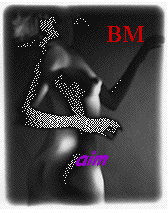 [ advertising space : webmaster ]
[ advertising space : webmaster ]
* Use Dada/Futurist texts for your improv; I like it better than the generic exercises.
new Spring 2002 THR221 Intermediate Acting (focus on biomechanics) * Comedy & Biomechanics Forum *
THR221 Intermediate Acting

GeoAlaska: Theatre & Film


biomechanics.vtheatre.net
Spring 2003: Don Juan

film books

virtual theatre
THR121
Fundamentals of Acting Fall 2004

ShowCases: 3 Sisters, Mikado, 12th Night, Hamlet, The Importance of Being Earnest, Dangerous Liaisons, Don Juan
prof. Anatoly Antohin Theatre UAF AK 99775 USA
 2006 *
*
stageplays *
2006 *
*
stageplays *

Organization of the book : SYNOPSIS
Dada in Script Analysis
DADA (1915-1920): Dada is the offspring of a specific world view which is hostile to bourgeois society and the principle of art for art's sake. Dada is opposed to ART.
Zurich was the birthplace of DADA.
Given Switzerland's neutrality, Zurich became a place of refuge during World War I.
Hugo Ball (pacifist and poet) and Emmy Hennings (poet and singer) fled Germany just after war was declared.
Ball started organising Cabaret style performances and was the initiator of the Cabaret Voltaire. This was one of the first clubs to start combining the multiplicity of avant-garde talent. The prime uniting feature of the Dadaists was a hatred of war.
Their primary aim was to enrage and taunt the public.
"Cabaret Voltaire"
one rented room in an inn * club house * artistic cabaret * nightly performances * included exhibition of avant-garde art work: Picasso, Marinetti, Arp.
15-20 tables, seating capacity of 35-50 people
performances lasted to early hours of morning (friction with neighbours and police)
anti-war/anti-art
dramatic readings of plays, novels, and poems.
improvised performances around Marcel Janco¡¯s grotesque masks (cardboard cut-outs, painted and glued).
most popular item was the recitation of simultaneous poetry.
members punctured performances with drums, gongs, howls, sirens and cow-bells.
[ pix ]
SummaryGrotesque is the exaggeration of features or of impulses or of particular characteristics. So a gargoyle for example is a grotesque. Any artist when they are looking at a subject tends to exaggerate some features and you see the extreme exaggeration like Picasso, you see it in say a Dobell, all artists have a particular eye that they bring to their subject. Now what Meyerhold does is bring his eye to performing, and he says "how can we make a really strong image on stage?" That image leads to the extension of character and you find that in the commedia. [ * ]


One Act Fest

^ The Shrew Film Directing "showcase" ^
NotesDada Theatre Overview *

2004 & After

 Proclamation without Pretension Tristan Tzara
~ Dadaism : Movement launched in 1916.
Proclamation without Pretension Tristan Tzara
~ Dadaism : Movement launched in 1916.
Dada = in French, a child's word for Horse.
Was decided to be the perfect term to mean nothing and yet everything.
Because of Dada, Everything, Anything, Everywhere, Anywhere, is Art.
~ The Founder : Tristan Tzara * Wrote Dada Manifesto (mission statement). Flourished chiefly in France, Switzerland, and Germany from about 1916 to 1920. Produced the last play in Dadaism. The Gas Heart Contained characters like Mouth, Nose, Eyes, Ears, etc.
Theatre and Art Respond to this Craziness.
~ The Core of Dada :
~ Dadaism was based upon the principles of deliberate irrationality, anarchy, and cynicism.
~ It was an anti-bourgeois form which was ultimately embraced by the bourgeois it attempted to reject.
Theatre and Art Respond to this Craziness.
- Before Dada art was in Form. After Dada Art is Attitude.
~ Dadaism had Three Goals :
~ Invent forms of senseless art with the purpose of shaking up the audience.
- Not necessarily theatre audience: readers, viewers.
~ Advance the notion of chaos so that all order, all systems, all conventions be abolished.
~ Wanted to bring about the utmost degree of misunderstanding between the audience and art.
~ A World Gone Mad :
~ Insanity was the cause of the problems in the world.
- Only a world gone mad could cause a World War.
~ Decided to replace logic with calculated madness.
~ Direct confrontation with their audience.
~ No restraint.
~ Illogical work.
~ Noise...made fun of anything that purported to be a solution to the problems.
~ Very Angry and Aggressive form.
Surrealism :
~ Andre Brenton wrote the Manifesto of Surrealism.
- Like the Dadaists, didn©öt like the current social or political situations.
- Felt that they could give answers and not just craziness.
~ Brenton was a originally a Medical student who had become interested in Freudian Psychology while working with shell-shocked soldiers from WWI.
~ Surrealism and the Unconscious mind.
- Focused upon Freud's psychology of the unconscious mind and dreams.
~ Wanted to get back to associating things instinctively and not logically.
- This would lead to new perceptions on the worlds problems.
The Theatre of Cruelty : Artaud
- Actor, director, and cult figure.
- Not Mainstream.
~ Did not involve texts.
- Improvisation.
- Theatre should be like therapy.
- Drama should be savage, like shock treatments.
- Goal was to cleanse the audience of guilt.
Related (Daniil Kharms):
The Oberiu Theatre (1928)
Suppose two people walk out on the stage, say nothing, but tell each other something by signs. While they are doing that, they are solemnly puffing out their cheeks. The spectators laugh. Is this theatre? Yes, it is. You may say it is balagan.[1] But balagan is theatre.
Or suppose a canvas is let down on the stage. On the canvas is a picture of a village. The stage is dark. Then it begins to get lighter. A man dressed as a shepherd walks onstage and plays on a pipe. Is that theatre? Yes.
A chair appears on the stage; on the chair is a samovar. The samovar boils. Instead of steam, naked arms rise up from under the lid.
All these—the man and his movements on the stage, the boiling samovar, the village painted on the canvas, the light getting dimmer and getting brighter—all these are separate elements of theatre.
Until now, all these elements have been subordinated to the dramatic plot—to the play. A play has been a story, told through characters, about some kind of event. On the stage, all have worked to explain the meaning and course of that event more clearly, more intelligibly, and to relate it more closely to life.
That is not at all what the theatre is. If an actor who represents a minister begins to move around on the stage on all fours and howls like a wolf, or an actor who represents a Russian peasant suddenly delivers a long speech in Latin—that will be theatre, that will interest the spectator, even if it takes place without any relation to a dramatic plot. Such an action will be a separate item; a series of such items organised by the director will make up a theatrical performance, which will have its plot line and its scenic meaning.
This will be a plot which only the theatre can give. The plots of theatrical performances are theatrical, just as the plots of musical works are musical. All represent one thing—a world of appearances—but depending on the material, they render it differently, after their own fashion.
When you come to us, forget everything that you have been accustomed to seeing in all theatres. Maybe a great deal will seem ridiculous. We take a dramatic plot. We develop it slowly at first; then suddenly it is interrupted by seemingly extraneous and clearly ridiculous elements. You are surprised. You want to find that customary logical sequence of connections which, it seems to you, you see in life. But it is not there. Why not? Because an object and a phenomenon transported from life to the stage lose their lifelike sequence of connections and acquire another—a theatrical one. We are not going to explain it. In order to understand the sequence of connections of any theatrical performance one must see it. We can only say that our task is to render the world of concrete objects on the stage in their interrelationships and collisions. We worked to solve this task in our production of “Elizabeth Bam.”
“Elizabeth Bam” was written on commission for the theatrical section of Oberiu by one of the members, D. Kharms. The dramatic plot of the play is shattered by many seemingly extraneous subjects which detach the object as a separate whole, existing outside its connection with others. Therefore the dramatic plot does not arise before the spectator as a clear plot image; it glimmers, so to speak, behind the back of the action. The dramatic plot is replaced by a scenic plot which arises spontaneously from all the elements of our spectacle. The centre of our attention is on it. But at the same time, separate elements of the spectacle are equally valuable and important to us. They live their separate lives without subordinating themselves to the ticking of the theatrical metronome. Here a corner of a gold frame sticks out—it lives as an object of art; there a fragment of a poem is recited—it is autonomous in its significance, and at the same time, independent of its will, it advances the scenic plot of the play. The scenery, the movement of an actor, a bottle thrown down, the train of a costume—they are actors, just like those who shake their heads and speak various words and phrases.
The Oberiu Group, or Association for Real Art, was rescued from oblivion for English-language readers by George Gibian in 1971, with the publication of a selection of the surviving work of Daniil Kharms (1905-42), and Alexander Vvedensky (1904-41), much of which they had never been able to have published. The Oberiu group to which they belonged was formed in Leningrad in 1926, its best known member the poet Nikolay Zabolotsky. Broadly futurist in tendency, though critical of zaum, the ‘transrational’ language explored by futurist poets (a splintered and reinvented language of emotive speech sounds), the Oberiu put on various readings and performances, wishing to be active in theatre and film as well as poetry and fiction. Its production of Kharms’ play Elizabeth Bam in 1928, however, together with the publication of its manifesto (whose section on theatre was apparently written by Kharms), incurred the disapproval of the authorities, and their programme of performances did not survive past 1930. Kharms and Vvedensky were both arrested in 1941; Vvedensky was shot, in obscure circumstances, soon after; Kharms died of starvation in the Leningrad blockade.
Twentieth-Century Theatre: A Sourcebook by Richard Drain; Routledge, 1995 pp. 48-
Next - Absurdism

Script Analysis Actor:
Theatre Books Master Page *
...
|

 2009 LUL
2009 LUL

















 & thr blog
& thr blog











 ...
...








